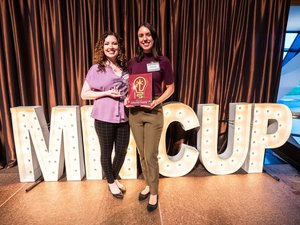
$58 billion: That’s the number of venture capital dollars invested in 3,912 companies across the U.S. so far in 2018, according to VC and M&A database Pitchbook.
In Minnesota specifically, more than $245 million was invested across 56 deals so far this year. The number of deals is up from both the last six months (37 deals) and the first six months (37 deals) of 2017, though the amount of capital is down slightly.
During the first half of 2017, Minnesota startups raked in a total of $332 million in capital, but a big chunk of that number can be attributed to one company: Bright Health, which raised a record-breaking $160 million (the largest venture capital round in Minnesota history) at the start of Q2 in 2017. Thanks in part to this deal, Q2 of 2017 is Minnesota's most profitable quarter for venture capital since Pitchbook started collecting this data in 2013.
Here are the three largest venture capital raises in Minnesota in the first half of 2018:
- Health insurance startup Bind Benefits has raised a total of $70 million since the start of the year. Bind first announced in January that it had closed its $60 million Series A in January, then raised another $10 million in June.
- Eden Prairie-based Metavention, a startup developing a medical device to treat Type 2 diabetes, closed on $65 million in venture capital in January.
- Business-software company KeyedIn Solutions closed on $15 million in financing to ramp up sales and marketing
Minnesota’s deals are in line with national trends that show the venture capital ecosystem changing shape, with capital being concentrated into fewer, larger deals.
Analyzing the first half of the year’s venture data, let’s take a look at several other national trends and how Minnesota fits into them.
Image Courtesy: Pitchbook
Angel/Seed Funding
When it comes to seed funding, deal sizes have gotten larger and are dominated by two trends—the emergence of pre-seed financing and the median age of startups. In Q2 2018, the median age of a company in the angel and seed stage rose to 3.11 years, up from 2.4 years in 2017, allowing for more time to develop successful business models and increase valuations.
Image Courtesy: Pitchbook
Early-stage
It’s not only angel and seed rounds that have gotten bigger. Early-stage deals have increased in value, too—deals over $25 million now make up more than 50 percent of 2018 early-stage deal value. Furthermore, the median amount of capital raised by companies at the Series A and B level has shown a steady growth pushing the median at Series A to $11.3 million and Series B to $29.3 million, representing a greater than twofold increase from 10 years ago, further illustrating the extreme shifts even at the early stage. Minnesota was slightly below the curve.
Image Courtesy: Pitchbook
Late-Stage
As mentioned earlier, late-stage deals have been getting a lot of attention. Another emerging trend is the increased activity by private equity (PE) investors as a result of increased competition in PE coupled with maturing venture-backed companies. VC financings with participation from a PE firm accounted for 30 percent of total deal value.
So far, $15 billion has been invested into 475 late-stage deals representing a remarkably steady volume of deals at the late stage. As investors retain their demand for developed businesses in the private markets, valuations have gotten loftier—valuations at the late stage in Q2 2018, which extended to $278 million—24 percent higher than 2017’s.
Image Courtesy: Pitchbook
Exits/IPO
Nationally, this year has been remarkable for companies debuting with a public offer. In the Great Lakes, the region saw nearly $1.1 billion generated across 46 exits.
Corporate VC
Thanks to the passage of U.S. tax reform in late December of 2017, corporates have turned into venture capitalists. A reduction in the U.S. corporate tax rate from 35 percent to 21 percent has been a boon for firms’ free cash flow (FCF), providing corporations with additional capital to direct into CVC investments. Software and life sciences sectors continue to receive increased focus from CVCs.
Image Courtesy: Pitchbook
Together, software and life sciences have received 62 percent of CVC deal count in 2018 so far. Defense companies especially have stepped up their investment game seeding a range of startups making new drones to batteries.
Full disclosure: measuring startup funding is a fickle task due to the timing of reporting with the Securities and Exchange Commission and because of how different VC monitoring groups gather information and categorize fundings. Additionally, deal flow in the first half of the year isn’t necessarily a yardstick for what happens in the second half.
Additional reporting from Maddy Kennedy








